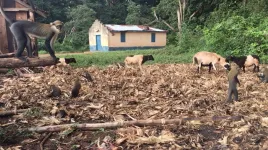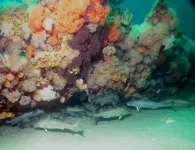Nearly half of those convicted of sharing explicit images of partners online show remorse
According to the CU Denver study, 56% of those convicted denied responsibility
2021-04-05
(Press-News.org) In a new study, researchers found nearly half of those who share explicit images of others without permission feel remorse after the fact and 24% try to deflect blame onto victims. Amy Hasinoff, a researcher at the University of Colorado Denver, joined Danish researcher Sidsel K. Harder, to take a deeper dive into the issue of sexual abuse and image sharing.
Hasinoff and Harder looked at how people who shared explicit images online spoke to police officers about the harmful acts they committed. While looking over cases where the image-sharer was caught and convicted, researchers found nearly half, 44%, of those cases involved the guilty party acknowledging sexual abuse, acknowledging shame, and telling redemption stories about making better choices in the future.
Deflecting Shame
In almost a quarter of all cases, people who committed image-based abuse assign the primary blame to the victim, consistent with the neutralization technique of denial of the victim. Denial of the victim is when the offender claims that the victim deserved what happened to them. The offender may justify the wrongdoing by saying that the victim was a bad person or deserved the abuse in some way.
"Sometimes, people choose to share sexual images of others without their permission," said Hasinoff. "They do this specifically to cause harm, and sometimes they do it out of negligence and carelessness or because they think it doesn't matter or they feel entitled."
Narrating Redemption
While many of those convicted of non-consensual image sharing shift the blame to someone else, 44% show some sort of remorse and acknowledge that they committed harmful actions. These people all plead "guilty" and express that they were ashamed of what they have done as a result of their anger with the victims, their need for respect from male peers, or their carelessness.
"What is particularly striking about this study is that a group of people who've done something really abusive are able to manage their shame by transforming their negative emotions into redemption stories about their better future selves," said Hasinoff. "At the same time, telling a redemption story, apologizing, or expressing shame does not guarantee a victim's or a community's forgiveness."
A redemption story is when a person who's done something bad talks about how they plan to never repeat that in the future and can include trying to make amends too. In this case, making amends could include apologizing, paying for services to remove images from the internet, or other ways of making things right with the person they harmed.
Hasinoff points out there are limitations to any study on shame and remorse since you never know if it is sincere. At the same time, emotions are social, especially shame, meaning that we can only ever feel it in relation to other people, and so it always depends on context. Even when we feel shame on our own, in our own minds, without others present, shame is typically still about what we think others think about us.
Why is this significant?
According to researchers, rather than stigmatizing people who have shared images non-consensually, future interventions might focus on helping them accept the guilt for their actions, and future research might investigate how to create the best conditions for someone who has shared images without consent to acknowledge the harmfulness of what they have done.
"Instead of seeing everyone who shares a sexual image without permission as an irredeemable 'bad person' and just punishing them, it might be better for the victim if the person who committed this kind of harm could get some guidance and help to understand the effects of what they did and to try to find meaningful ways to repair that harm," said Hasinoff. "This is a society-wide problem that is rooted in gender norms - like the way some men feel entitled to treat women as sexual objects - so part of the solution has to be helping people understand why and how to unlearn those ideas."
INFORMATION:
Support from the American Council of Learned Societies & the Hanse-Wissenshaftskolleg contributed to work on this topic.
ELSE PRESS RELEASES FROM THIS DATE:
2021-04-05
People with ovarian cancer frequently receive aggressive end-of-life care despite industry guidelines that emphasize quality of life for those with advanced disease, according to a recent study.
In fact, by 2016, ICU stays and emergency department visits in the last month of life had become more common for people with ovarian cancer than they were in 2007, the earliest year from which researchers analyzed data.
The proportion of non-Hispanic Black people who turned to the emergency department for care was even higher -- double that of non-Hispanic whites. Black people were also nearly twice as likely to undergo intensive treatment, including ...
2021-04-05
One day, humankind may step foot on another habitable planet. That planet may look very different from Earth, but one thing will feel familiar -- the rain.
In a recent paper, Harvard researchers found that raindrops are remarkably similar across different planetary environments, even planets as drastically different as Earth and Jupiter. Understanding the behavior of raindrops on other planets is key to not only revealing the ancient climate on planets like Mars but identifying potentially habitable planets outside our solar system.
"The lifecycle of clouds is really important when we think about planet habitability," said Kaitlyn Loftus, a graduate student in the Department ...
2021-04-05
DURHAM, N.C. -- Integrating the American classroom has long been a goal of many who seek to eradicate racial discrimination. But a new paper from four economists, including Duke University's William A. "Sandy" Darity Jr., suggests that Black students do not always benefit from attending racially balanced schools.
Instead, Black adults who attended racially balanced high schools in the mid-20th century completed significantly less schooling than those who attended either predominantly black or predominantly white schools, the authors found.
"Standard wisdom has it that school desegregation paves the way to racial ...
2021-04-05
NEW YORK, APRIL 5, 2021 -- Nine of the hottest years in human history have occurred in the last decade. Without a major shift in this climate trajectory, the future of life on Earth is in question. Should humans, whose fossil-fueled society is driving climate change, use technology to put the brakes on global warming?
Every month since September 2019 the Climate Intervention Biology Working Group, a team of internationally recognized experts in climate science and ecology, has gathered remotely to bring science to bear on that question and the consequences of geoengineering a cooler ...
2021-04-05
SARS-CoV-2 showed the world with devastating clarity the threat undetected viruses can pose to global public health. SpillOver, a new web application developed by scientists at the University of California, Davis, and contributed to by experts from all over the world, ranks the risk of wildlife-to-human spillover for newly-discovered viruses.
SpillOver is the first open-source risk assessment tool that evaluates wildlife viruses to estimate their zoonotic spillover and pandemic potential. It effectively creates a watchlist of newly-discovered viruses to help policymakers and health scientists prioritize them for further characterization, surveillance, and risk-reducing interventions.
The tool is linked to a study published in the journal PNAS, in which ...
2021-04-05
New Haven, Conn. -- In a new study, Yale Cancer Center researchers have defined the genetic landscape of uterine leiomyosarcomas (uLMS). Furthermore, using fully sequenced patient-derived xenografts, the team has preclinically validated new treatment modalities, which may point to new treatments for uterine cancer. Study results were published online in an early edition of the Proceedings of the National Academy of Science (PNAS).
Uterine cancer is the most common gynecologic malignancy and uterine leiomyosarcomas (uLMS) are highly lethal sarcomas arising from the myometrium, the smooth muscle layer of the uterus. They represent ...
2021-04-05
Overfishing likely did not cause the Atlantic cod, an iconic species, to evolve genetically and mature earlier, according to a study led by Rutgers University and the University of Oslo - the first of its kind - with major implications for ocean conservation.
"Evolution has been used in part as an excuse for why cod and other species have not recovered from overfishing," said first author END ...
2021-04-05
BOSTON - Men and women whose mothers experienced stressful events during pregnancy regulate stress differently in the brain 45 years later, results of a long-term study demonstrate.
In a unique sample of 40 men and 40 women followed from the womb into their mid-forties, the brain imaging study showed that exposure during fetal development to inflammation-promoting natural substances called cytokines, produced by mothers under negative stress, results in sex-associated differences in how the adult brain responds to negative stressful situations more than 45 years after ...
2021-04-05
High levels of biodiversity in aquatic settings offers a wide range of vitamins, minerals, and fatty acids crucial for human health, a range of nutrients that are lacking in ecosystems where the number of species have been reduced by overfishing, pollution, or climate change, researchers report April 5 in the journal Proceedings of the National Academy of Sciences.
"What we found is that biodiversity is crucial to human health," said Yale's Joey Bernhardt, a G. Evelyn Hutchinson Postdoctoral Fellow in the Department of Ecology and Evolutionary Biology and co-author of the paper.
While humans can achieve their protein requirements even with seafood from less-diverse systems, ...
2021-04-05
A growing body of evidence suggests that biodiversity loss increases our exposure to both new and established zoonotic pathogens. Restoring and protecting nature is essential to preventing future pandemics. So reports a new Proceedings of the National Academy of Sciences (PNAS) paper that synthesizes current understanding about how biodiversity affects human health and provides recommendations for future research to guide management.
Lead author Felicia Keesing is a professor at Bard College and a Visiting Scientist at Cary Institute of Ecosystem Studies. She explains, "There's a persistent myth ...
LAST 30 PRESS RELEASES:
[Press-News.org] Nearly half of those convicted of sharing explicit images of partners online show remorse
According to the CU Denver study, 56% of those convicted denied responsibility


